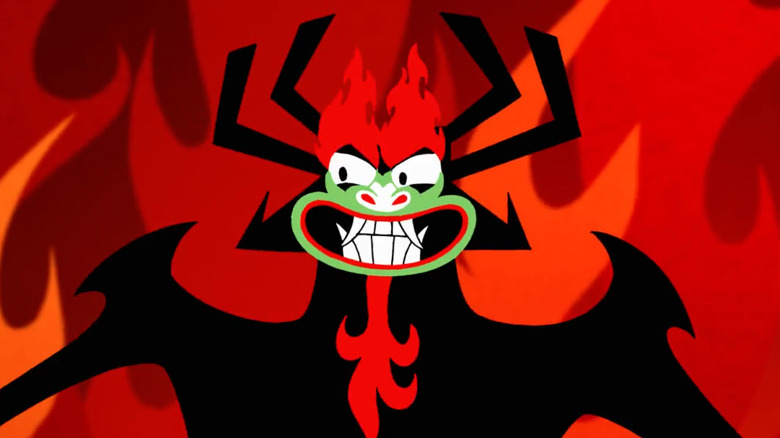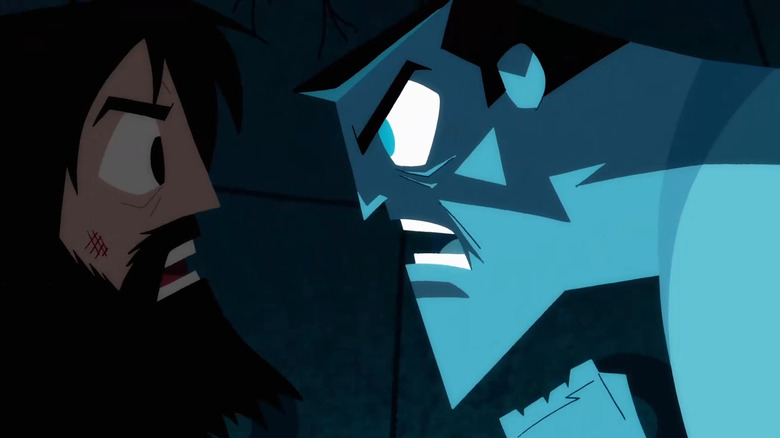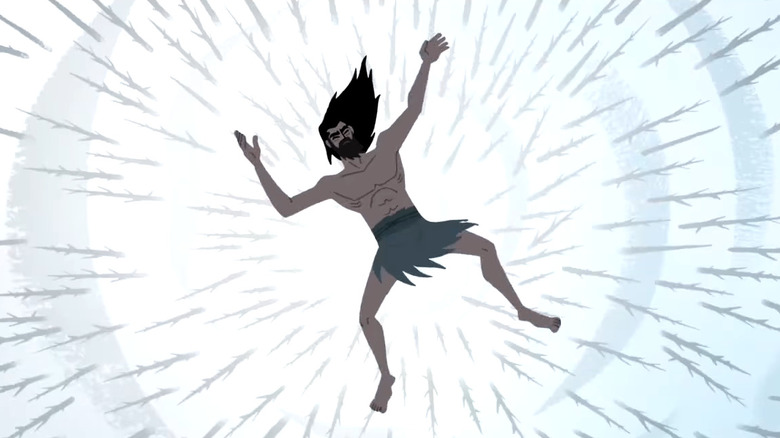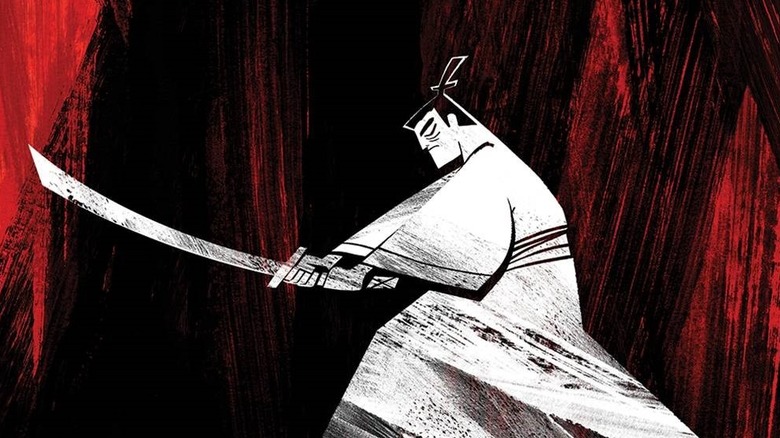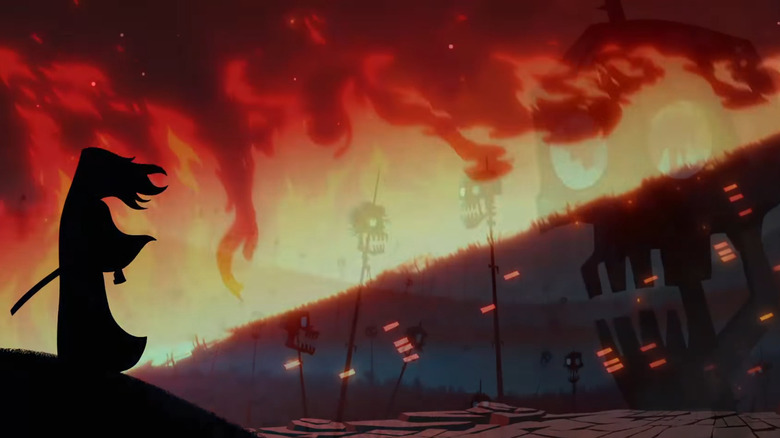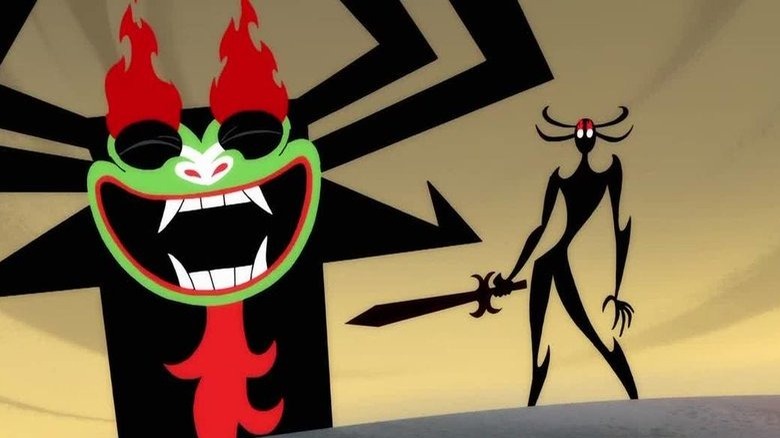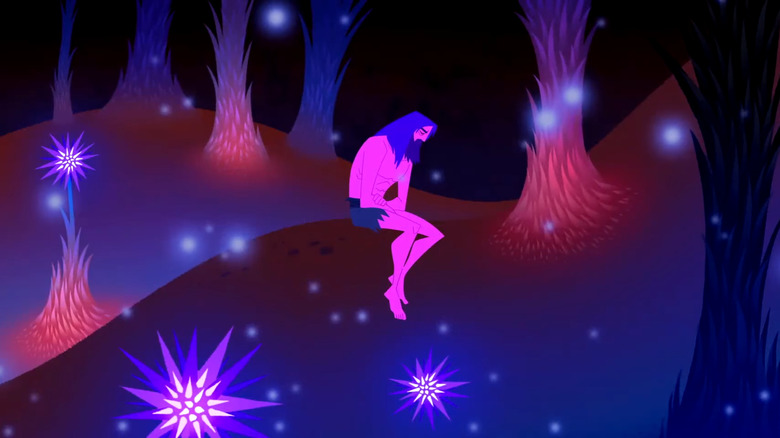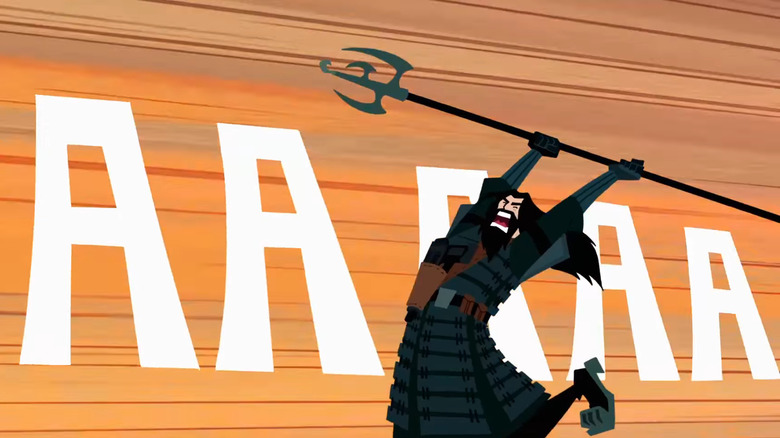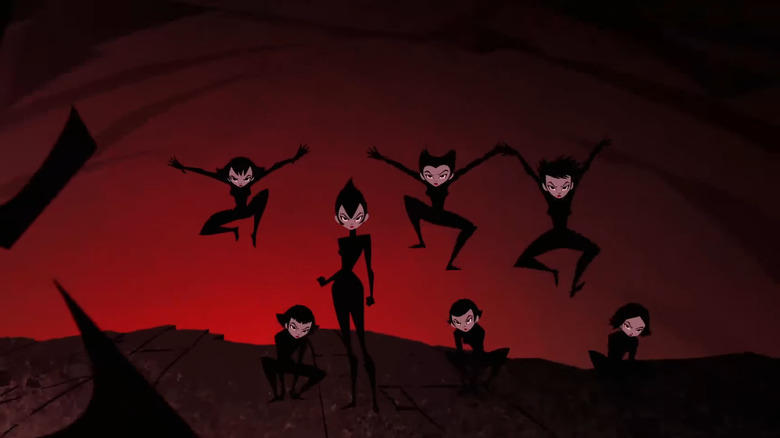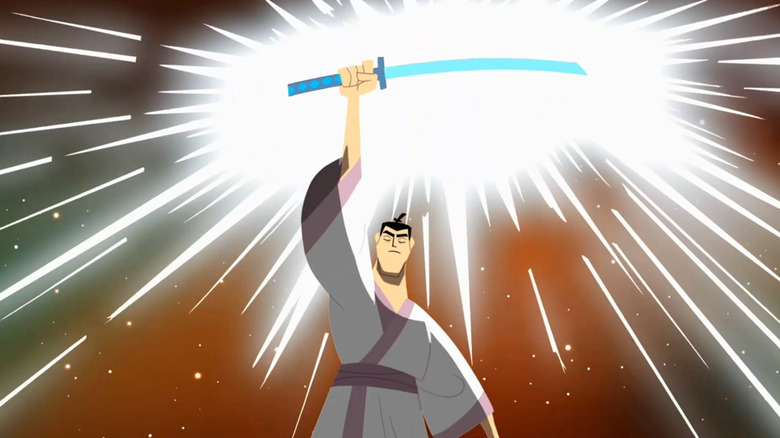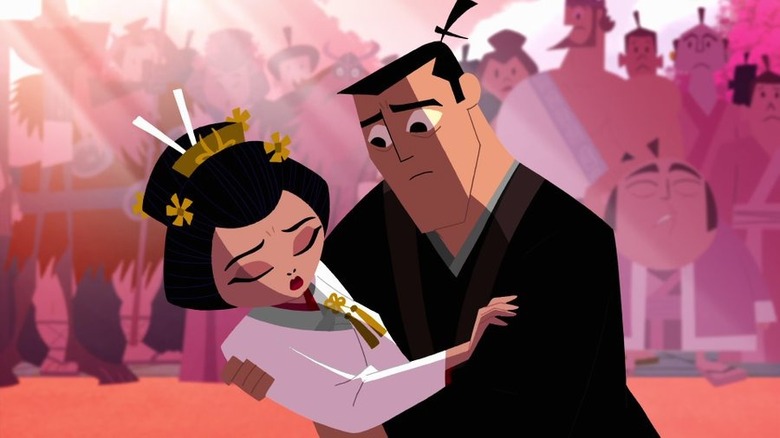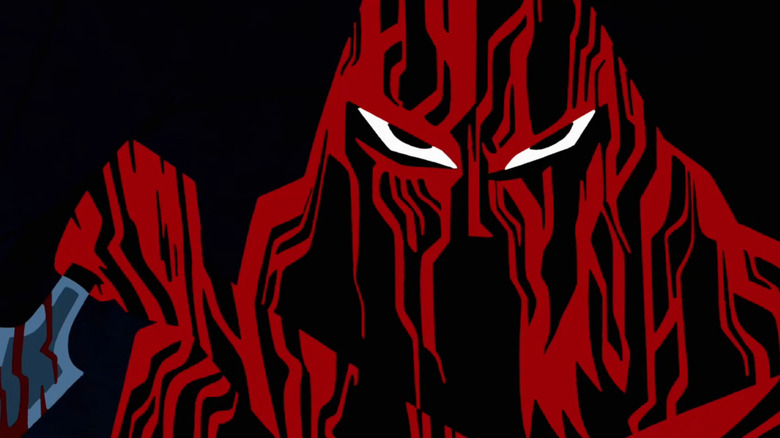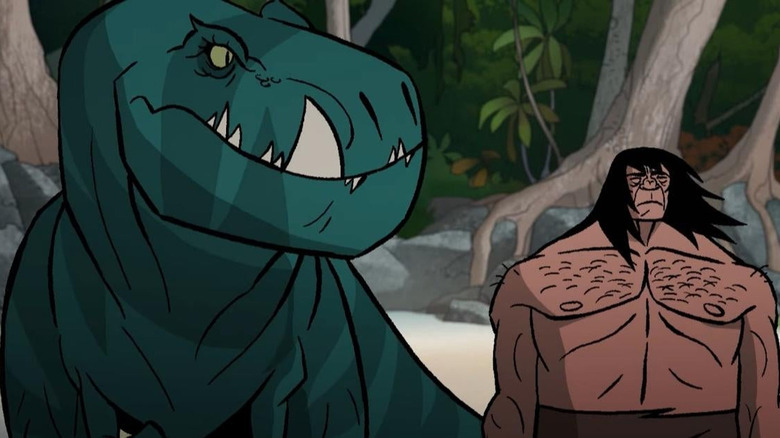The Ending Of Samurai Jack Finally Explained
Taking cues from the 1972 series "Kung Fu" starring David Carradine as well as countless samurai movies and fantasy franchises, "Samurai Jack" premiered in 2001 and ran for four seasons on Cartoon Network. The animated series told the story of a prince whose mystic sword grants him powers beyond those of ordinary men, which comes in handy when he needs to fight to free his people from the demonic Aku. Though his sword grants him the edge needed to defeat Aku, the villain is a master of trickery and deception, and he's able to thwart Jack's victory by transporting him into a future where Aku has already won. This leaves Jack fighting to return to his own time to prevent this reality from ever coming to pass.
With a premise like that, it might go without saying that this series is very awesome indeed—so awesome that got a reprisal. After unceremoniously drawing to a close in 2004, "Samurai Jack" returned 13 years later in 2017. This allowed the series to go out on its own terms, and the network shift from Cartoon Network to Adult Swim meant that the show could go all-out on the violence while also doubling down on some of the more philosophical or even heartbreaking themes of the premise. Coming in to close out what was already easily one of the most intriguing series in modern animated history, the fifth season of "Samurai Jack" remains a bit of a paradox, but that's just all the more reason why it's so great—and worthy of closer analysis.
The original series run
During a solar eclipse, Aku is awakened from his ancient imprisonment. Our hero Jack is only a boy when this occurs, and he is helpless while Aku not only destroys his father but also the village they called home. He and his mother escape with the magical sword, but they are separated so that Jack might train with the most skilled fighters in the world in hopes of one day defeating Aku. When he finally gets his one-on-one with the demon, Aku uses his powers to force Jack into the future. Jack is unable to return to his own time, instead forced to make his way through a retro-futuristic world in which Aku's influence reaches far and wide. Forever in search of the time gate that might allow him to leave this dystopian world, Aku is aware of the existence of these temporal anomalies and uses them to taunt Jack as he desperately attempts to get home.
This premise dominates much of the first four seasons of the series, allowing the show to take on an episodic quality as each chapter shows him engaging with a new challenge, and, naturally, a new, epic fight scene that tests his mettle. Though Jack nearly achieving victory only to have it snatched from him in the last moments might have been repetitive in lesser hands, these four seasons are full of some of the best character work and fight scenes you're likely to find on TV.
But there was no actual ending
The fourth season ends on an open note, leading many to speculate that it was canceled. According to creator Genndy Tartakovsky, it was much more a matter of burnout after four full seasons of work than anything else. In an interview with NPR, Tartakovsky explained that the changing slate at Cartoon Network and the potential restriction of creative freedom alongside the tantalizing new offer to work on "Star Wars: The Clone Wars" series simply combined to make it the perfect time to leave the series. Being as "Clone Wars" is extremely great, even the most devoted "Samurai Jack" fan might agree that this is a pretty solid reason to depart.
However, due to the unplanned nature of the conclusion, it doesn't exactly conclude. The fourth season continued the premise described above that the first three seasons stuck to, but the influx of giant robot battles over cities and laser-shooting structures gave it an increasingly high-tech and post-apocalyptic feel. Likewise, Jack meets a number of interesting new characters in this season, with genre nods to everything from film noir to "Star Wars" along the way. The final episodes show Jack bonding with a kid he saves from ogres only to pass the infant back to his mother. This season is a ton of fun, but it's easy to understand why nobody seemed totally convinced that this was the actual ending of the "Samurai Jack" story.
Out of continuity comics and the film that never was
For years after the apparently final episode of "Samurai Jack" aired, Tartakovsky kept the project on the back burner in his mind. In an interview with ComicBook in 2015, the creator explained that he felt the series had only grown more popular with time, and made references to the years he spent in development hell over the possibility of a feature film to conclude the story. Even then, he noted that perhaps the inability to manifest a movie simply meant that the story was begging to return for a full season of the show in order to close itself out. Frankly, having seen the final results of all these, we really couldn't agree more. However, fans desperate for more Jack were not totally deprived over that 13-year hiatus.
IDW released a comic that has since been collected as the "Samurai Jack: Tales of the Wandering Warrior" omnibus, which pulls together all 20 issues of the run. Though this series is not considered canon by the creator and doesn't sync up with the events of the fifth season, it's still a heck of a lot of fun. The comic is penned by a regular contributor to major Marvel Comics series like "Thunderbolts" and "Champions," Jim Zub, and features art by Andy Suriano, among others, and features a highly entertaining alternate ending for Jack megafans. Since the conclusion of the fifth season, there have been two more miniseries, "Quantum Jack" and "Lost Worlds," and Jack has even appeared in some crossovers. For comic fans, "Samurai Jack" might continue indefinitely, if sporadically.
The revival and a 50-year time jump
This all brings us to 2017, when a network change to Adult Swim brought us the final 10 episodes of "Samurai Jack." Tonally, it's clear from the start that this is going to be a more intentional slow-burn that drops threads in the first episode that won't conclude until the final one airs, making it a slightly different ballpark from the beginning, even without the increased bloodshed that a more adult-oriented network and rating inherently bring. We discover that Jack no longer ages due to the effects of time travel, and so although 50 years have passed since the last episode, he remains physically much the same as last we saw him.
However, the years have had a grinding effect on him, and much of the season follows his attempts to reconcile this alongside his ongoing fight against evil. Even in the beginning, we see that Aku has essentially won, having destroyed all the time portals, but that Jack refuses to quit. Thereby, even as Aku mostly avoids him, Jack's war is nowhere close to complete. We also discover that Jack has lost his magical sword that kept Aku from engaging with him head-on for so long, but Aku doesn't know this. Inspiring many to take up the fight against Aku, Jack has achieved status as a legendary hero, but the emotional fallout from this has been extreme as we see him troubled by visions of destruction and death.
Aku's voice change
It's no secret that "Samurai Jack" pulled in some serious heavy hitters for its main cast, with the great Phil LaMarr voicing Jack throughout its run. Known best for his lengthy stint on "Mad TV" in roles like the hyperactive UPS Guy, among others, LaMarr brought Jack to life in ways that no one else could, tapping into the classic "Kung Fu"-style dialogue and adding a twist all his own. Likewise, voice-acting icon Tara Strong joined the fifth season as the voice of Ashi. Finding the perfect Aku was no small feat, with the series needing to find someone capable of delivering over-the-top villainous dialogue serious enough that he could remain a believable threat throughout a lengthy run.
For that, the series cast legendary actor Mako, who was acting in films since the late 1950s, turning out memorable roles in movies like "Conan: The Barbarian" and its follow-up "Conan: The Destroyer." Though he was frustrated throughout his career due to the limited roles available to Asian actors, he stayed working over the course of decades, turning out a number of unforgettable appearances in genre films as well as lending his voice talents to "Avatar: The Last Airbender." Aku was among Mako's later roles, and he passed away from esophageal cancer in 2006. In the fifth season, Aku is voiced by Greg Baldwin, but Mako's name makes a return to the credits in the final episode due to the magic of archival audio.
The themes
The themes of "Samurai Jack" might seem pretty basic at the outset, with a classic good versus evil dichotomy set up from the start that allows Jack to shine as a hero while constantly being undermined by a distant villain. Yet, as the series travels on throughout its five seasons, it becomes increasingly complex, as Jack's status as a hero is occasionally thwarted by unforeseen complications, such as the fourth season subplot in which he ingested a speck of Aku's illness and very nearly became an unstoppable force for evil himself if not for the help of a strong community that got him through it. Indeed, some of Jack's best moments show that the hero is only as strong as the people who surround him in his times of distress.
Likewise, while "Samurai Jack" begins as a top-notch action series, the 50-year time jump allows for greater commentary on the long-lasting effect so much death has had on Jack. The loneliness he feels due to his forced separation from his family never goes away, and while he is able to make new connections in this futuristic world, he's inherently emotionally distanced from them through the knowledge that his basic mission would ensure this version of the world would never come to pass. In the end, Jack is a deeply tragic figure, although well-intentioned and brave, and the final episodes deliver that message to viewers in no uncertain terms.
Jack and Aku as the classic hero/villain duo
Aku is a classic demonic villain, completely self-interested and viewing all of humanity as simply pawns in his game of global domination. Each attempt to disarm him seems only to make him stronger. He cheats, lies, and steals, showing no regard or remorse for the lives ruined. Believing himself destined to sit atop the throne and the world fated to lay at his feet, there is rarely an attempt in the series to humanize Aku or flesh him out beyond his wicked goals. Not only does he view himself as superior, but he exists to empower others who are as morally derelict as he, hoping to encourage an eternity of warfare and suffering.
However, each horror he inflicts leaves a world of victims struggling to heal, and Jack fights every day for them, even knowing that to succeed would mean the world would fundamentally change and perhaps preclude them from existence. Even as gifted and brave as he is, Jack seems to be unable to defeat Aku, which leaves him struggling with the pain he's both experienced and witnessed. Worried that he is becoming more like Aku by battling him, Jack struggles to stay true to his mission even as all hope seems lost. Often, these types of stories can be more interesting when the villain is granted a more sympathetic backstory, but by absolutely refusing to give one to Aku, both hero and villain are allowed to shine for who they are, making this one of the great protagonist/antagonist pairings for the ages.
The daughters of Aku
When Aku is amused by the activities of a cult that worships him, he grants the cult leader a small portion of his power, and she, in turn, gives birth to many daughters, known as the Daughters of Aku. These young women are trained from childhood to eventually slay Jack, which they very nearly succeed in doing when they cross paths with him while he is without his sword. He ends up killing one of them but is devastated to realize that they are human, and grapples with having killed, even if in self-defense. As for the Daughters, their life's purpose is thwarted in a truly epic fight scene in which Jack first offers them the chance to walk away, then, when they refuse, sets about his grim business of hunting and killing them one by one until they are all defeated.
All of them, that is, except Ashi, a particularly rowdy daughter who is not at all pleased to be taken captive by Jack, though she ultimately falls in love with him. Despite wanting him dead, she sees him happily playing with a ladybug, and it reminds her of a time when her mother squashed a ladybug in front of her only to prove a point, which softens Ashi. She goes on to be Jack's greatest friend and, ultimately, his fiancée. Though that doesn't end particularly well, it grants her a second life as a woman able to make her own choices outside of the evil intentions of her parents.
His lost sword
Jack's sword is his most important asset through the first four seasons, but by the time of the fifth, it's gone, and he seems unprepared and ill-equipped to find it. We discover throughout the season that he loses the sword when Aku tricks him into believing a small legion of adorable baby goats is actually a monstrous bull. When he slays the bull, he realizes he's killed his small friends and drops his sword down a deep hole. Fortunately, Aku doesn't immediately realize its absence. His lead henchman Scaramouche, thought to be defeated, is able to survive and deliver the news to Aku, ending any advantage Jack once had in their seemingly unending fight.
However, while a demon army advances on him and Ashi, Jack goes into a deep state of meditation, which enables him to come face-to-face with an array of gods from different mythologies. These gods accept that he is worthy to wield the great power of the sword and return it to him, marking the first time we see him with it (except for flashbacks). Likewise, Jack's former appearance, with his clean white robe and shaved face, is restored, showing that, though this has been a wild ride, Jack is back in action and ready to face Aku for a showdown.
Ashi and Jack
Jack's relationship with Ashi is a big part of what makes up the heart of the last season. Her training as a remorseless killer bent on causing his death and her anger at seeing him annihilate her sisters ultimately fade away when she realizes that her mother and father are both evil and Jack is ultimately good, even when he is forced to do horrible things. First, they work together to free a legion of possessed children, but when Jack believes that the children have actually died, he leaves her alone despite her epic about-face earlier that episode. Still, she is determined to follow a better path, and tracks Jack down, saving his life when he is on the verge of dying by suicide.
Attempting to help Jack retrieve his sword, she fights off an army single-handedly and kills her mother, having discovered the terrible truth of her desire to bring greater destruction upon the planet by helping Aku, as well as realizing how little she cared for her daughters outside of being pawns in Aku's games. The two bond, but Jack attempts to leave her behind, realizing how messy his final fight with Aku is about to get. She joins him regardless, and even when Aku uses his influence over her, she is able to overcome it with Jack's help. Though the great tragedy of this season is that even after they win, Ashi fades to nothingness due to Aku's demise uncreating her. Jack smiles in the end, remembering the ladybug that initially bonded them.
Final conclusion
So much of the final season of "Samurai Jack" shows a man on the ropes, having long since lost his family and gotten separated from his time, but now without even the sword that gave him much of his power. However, without the sword, we see Jack truly become a man of the people, regardless of all he has lost. When he comes up against his own negative spirit, a wolf with which he shares a kinship helps ground him, and the two spend time healing together in a cave. Ultimately, this is a major plot point for the conclusion of the series, which shows Jack's loneliness while likewise granting the counter-narrative that, through the people whose lives he's touched, he finds his catharsis.
The final battle against Aku is indeed iconic, but it's impressive mostly due to how small a role Jack plays in it. While he is able to strike the killing blow that sees Aku's demise and peace restored to the land, he never would have gotten to that place without the community of people he has helped along the way rising up to show him support. From recurring guest stars to Ashi herself, we see that Jack's good deeds were never meaningless, and have always fostered a level of goodwill that allows him to win this battle.
Genndy Tartakovsky continues breaking ground with 'Primal'
"Samurai Jack" may go down in history as one of animation's most surprising works, running the gamut from an enjoyable jaunt through martial arts action tropes to one of the most devastating studies of loss and loneliness to have ever graced the small screen. Yet Genndy Tartakovsky is nowhere near finished yet. While his follow-ups in film and TV have been plentiful, including work on megahits like "Star Wars: The Clone Wars" and the "Hotel Transylvania" franchise, perhaps the most striking spiritual successor to "Samurai Jack" is HBO Max's "Primal," which taps into his long-standing love of genre staples and the top-notch action of "Jack" while also delving into some of the emotional and philosophical themes "Jack" explored.
"Primal" tells its story completely without dialogue until a single word is spoken at the end of the first season, though the show might run for several episodes without viewers noticing it considering how well it uses the space left where exposition would usually be. Introducing us to a pair of lonely wanderers brought together by tragedy when their families are destroyed by ruthless predators, the series manages to communicate some of the major abstract themes of "Samurai Jack," such as grappling with isolation. One of the great feats of "Primal" is that it studies the fear of possibly pending extinction and obsolescence, making this prehistoric action-adventure one of the most surprisingly poignant shows to air in recent years. You know, kind of like "Samurai Jack" and its groundbreaking final season.
